According to the EU Observer, Gazprom’s fourth-quarter profits in 2008 dropped 84 percent, to €811 million. That means a decline of €4.2 billion. Ouch. What’s more, Gazprom is limping into the lean years carrying a whopping €30 billion in debt. I imagine all the windfalls from the fat years went straight into Russia’s reserve fund, but Moscow has been burning through that to prop up the ruble and finance its budget deficit. According to Russian Finance Minister Alexei Kudrin (via Robert Amsterdam), the fund will be “practically exhausted” in 2010. In mid-April, Kudrin suggested that Russia might turn to foreign […]
Europe Archive
Free Newsletter
In case you haven’t noticed, the latest WPR Feature Issue just went live. It’s a multifaceted look at, Germany, the great power that somehow isn’t. I’ve got a hunch this is going to be one of those timely features, not necessarily in media cycle as measured by days or months, but in historical cycles as measured in years and decades. For a variety of historical and political reasons, many of them clear and others less obvious, Germany has carved out a unique place for itself in the international arena, emphasizing non-militarism and multilateralism. But with the very multilateral order on […]
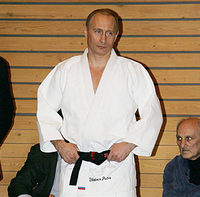
During a three-day visit to Japan last week, Russian Prime Minister Vladimir Putin pushed commercial deals and received an honorary degree from Tokyo University for his efforts to improve Russian-Japanese ties (as well as for his knowledge of judo, in which he holds a black belt). But as expected, the Russian and Japanese governments made little progress in resolving their territorial dispute over four islands that Russia seized from Japan at the end of World War II. The dispute over the islands — the Russians call them the Southern Kurils, while the Japanese refer to them as their Northern Territories […]
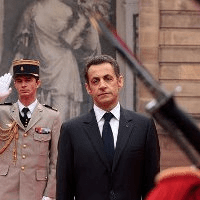
On May 16, Nicolas Sarkozy marked his second anniversary as the president of France. Despite having done much of what he promised to do when the French elected him with just over 53 percent of the vote, polls show that nearly 70 percent now disapprove of the results. Circumstances have not helped: The worst economic downturn since the Depression has overwhelmed a program of cautious reforms that was never as bold or ambitious as the candidate claimed. Yet most people in France expect Sarkozy not only to ride out the storm, but to win re-election in 2012. Such a double […]
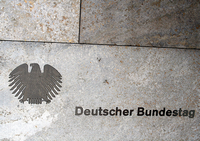
When the Berlin Wall fell 20 years ago, the event’s historic significance was immediately obvious. A divided Germany had been both the linchpin of the agreements sealed at Yalta and Potsdam in February and July of 1945, respectively, and the central fault line of the divided European continent they created. In what amounted to a recasting of some 300 years of European history, post-War European affairs were conducted under the umbrella of opposing blocs, and peace was based on nuclear deterrence. With the Wall gone, the Cold War political order was swept away. Less than one year later, a reunified […]
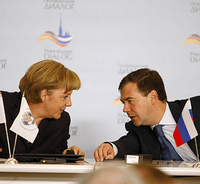
Germany’s policy of engagement and partnership with Russia is rooted in the German experience within Europe. If economic interdependence and integration could transform Germany after both World War II and the Cold War, so German thinking goes, then it might also transform Russia. Nevertheless, nearly 20 years after the end of the Cold War, Germany’s efforts — as well as those of Europe and the U.S. — to transform and integrate Russia have failed. Over the past decade, Vladimir Putin’s Russia has forcefully rejected integration with the West, predicating its desire for a return to great power status on expanded […]
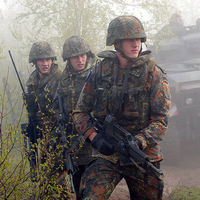
More so than that of other countries, the foreign policy pursued by the Federal Republic of Germany displays deep historical fractures and discontinuities. This reflects the country’s profound identity crisis in the aftermath of the twin disasters of National Socialism and the Second World War. The failure of German hegemonism and power politics after 1870-71, culminating in the unique crimes of the National Socialist dictatorship, underscored the country’s need for a radical break with its old nationalist and militaristic past, and resulted in a renunciation of traditional power politics. Key features of German foreign policy since 1945 include a culture […]
To be a fan of the Eurovision Song Contest — that yearly competition which undermines any notion of European cultural superiority — requires either a complete lack of aesthetic judgment or a strong sense of fun and irony. Just as Europeans can sneer at Super Bowl half-time shows and Las Vegas vaudeville acts, Americans can look on in wonder at sado-masochistic dance routines set to bouncy polka music, with enough smoke and flashing lights to give Donald Rumsfeld’s “shock and awe” a run for its money. Nevertheless, you have to hand it to Norway, which walked away with this year’s […]
Steven Erlanger flags a real paradox for EU enthusiasts and a boon for its detractors: The EU parliament actually wields more power than people generally realize, but for a variety of reasons that Erlanger explains well, it generates very little interest among potential voters. That reinforces the perception of an anti-democratic EU technocracy based in Brussels, and undermines the potential for popular democratic involvement that currently exists in Strasbourg. Meanwhile, this EU Observer piece on the European Space Agency’s launch yesterday of the world’s biggest space telescope illustrates the ways in which some areas where Europe has excelled simply don’t […]
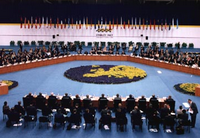
SKOPJE, Macedonia — On May 1, the European Union celebrated the fifth anniversary of its “big bang,” the massive wave of enlargement in 2004 that saw it accept 10 new members — eight former communist countries from Eastern Europe, plus Malta and Cyprus. When Romania and Bulgaria joined two and a half years later, in 2007, the EU counted 27 member states, almost half a billion people and 30 percent of the world’s GDP. In the years since, the EU’s enlargement policy has been considered an unequivocal success. It has brought jobs and growth to the new member states, and […]
There are a few items to flag on restrictions to immigration and internal movement in Europe, something I’ve been keeping a pretty close eye on: – Soeren Kern’s WPR Briefing from yesterday on how Spain’s problems with unemployment have led to a rethink of its immigration policy. – Risto Karajkov’s WPR Briefing on EU enlargement and the Balkans also includes mention of the EU’s eagerly anticipated visa-waiver program for the region, which might be another casualty of the financial crisis. – This EU Observer item describes how Switzerland is considering invoking an emergency clause in its bilateral immigration accords with […]

BARCELONA, Spain — As the once-vibrant Spanish economy plunges deeper into recession, the government of Socialist Prime Minister José Luis Rodríguez Zapatero is struggling to staunch the country’s skyrocketing jobless rate. And among the first casualties is Spain’s famously lenient immigration policy. With employers shedding jobs at a record pace, Spain’s unemployment rate has nearly doubled over the past year to 17.4 percent, the highest in the European Union. More than 4 million Spanish workers are now unemployed, and that number is expected to reach 5 million by 2010 (.pdf). One million Spanish families now have no source of income, […]
There was a sense of “here we go again” last week, when the government of Georgian President Mikheil Saakashvili claimed to have suppressed an army mutiny fomented by Moscow, even as some 600 troops from several nations including the United States arrived in Tblisi for the start of a NATO-led exercise. Last August, the Georgian army began its ill-fated attack on the separatist region of South Ossetia a week after the end of a combined U.S.-Georgian exercise. Over 100 American military personnel were still in Georgia when the Russians counterattacked and swept across Georgia like a knife through butter. The […]
One of the great things about a blog is that you actually have a record of all the wild predictions you make that end up coming true. (The downside is that all the ones where you were dead wrong are there, too, but the less said about that the better.) Not only that, though, the act of writing them down helps you to actually remember them. An old friend of mine visiting Paris a month back reminded me how, fifteen years ago, I’d predicted that eventually, survival in modern society would depend on access to one corporation — the phone […]
Last week, in his regular WPR column, David Axe drew the distinction between the often-incompetent foot soldiers conducting pirate hijackings off the Somalian coast, and the more sophisticated criminal networks that finance and direct them. Today, Nicolas Gros-Verheyde flags an article in the Spanish press. The article cites an EU NAVFOR military report to the effect that the Somalian pirates are being fed precise data on commercial shipping in the region by “well-placed persons” in London, and that the pirates avoid certain (read: British) vessels. Gros-Verheyde adds the caveat that the document just happened to make its way into the […]
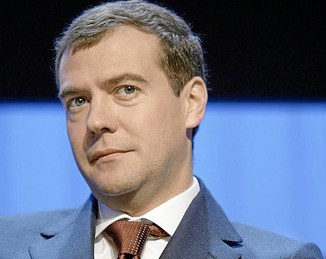
Russian President Dmitry Medvedev’s political legacy is inextricably linked to that of his predecessor, Vladimir Putin, in ways that go beyond mere political lineage. After then-President Putin endorsed Medvedev to succeed him in December 2007, Medvedev announced his intention, if elected, to name Putin as prime minister. With their slogan, “Together we will win,” the two reassured voters that they would continue the popular policies of Putin’s presidency. With the backing of Putin and his allies, and with the government restricting the activities of opposition candidates, Medvedev easily won the March 2008 presidential elections with more than 70 percent of […]
I’d like to flag this testimony by Daniel Hamilton (.pdf) to a Senate Foreign Relations Committee hearing on NATO’s strategic vision moving forward. It’s a nicely nuanced take on what is often portrayed — and here I include myself among the guilty — as an either/or affair. The strength of Hamilton’s approach is to distinguish between NATO’s “home” and “away” roles, then further distinguish between where it should lead, where it should support, and where it should selectively do one or the other on all of the core missions on both sides of the ledger (p. 3). That’s followed by […]
